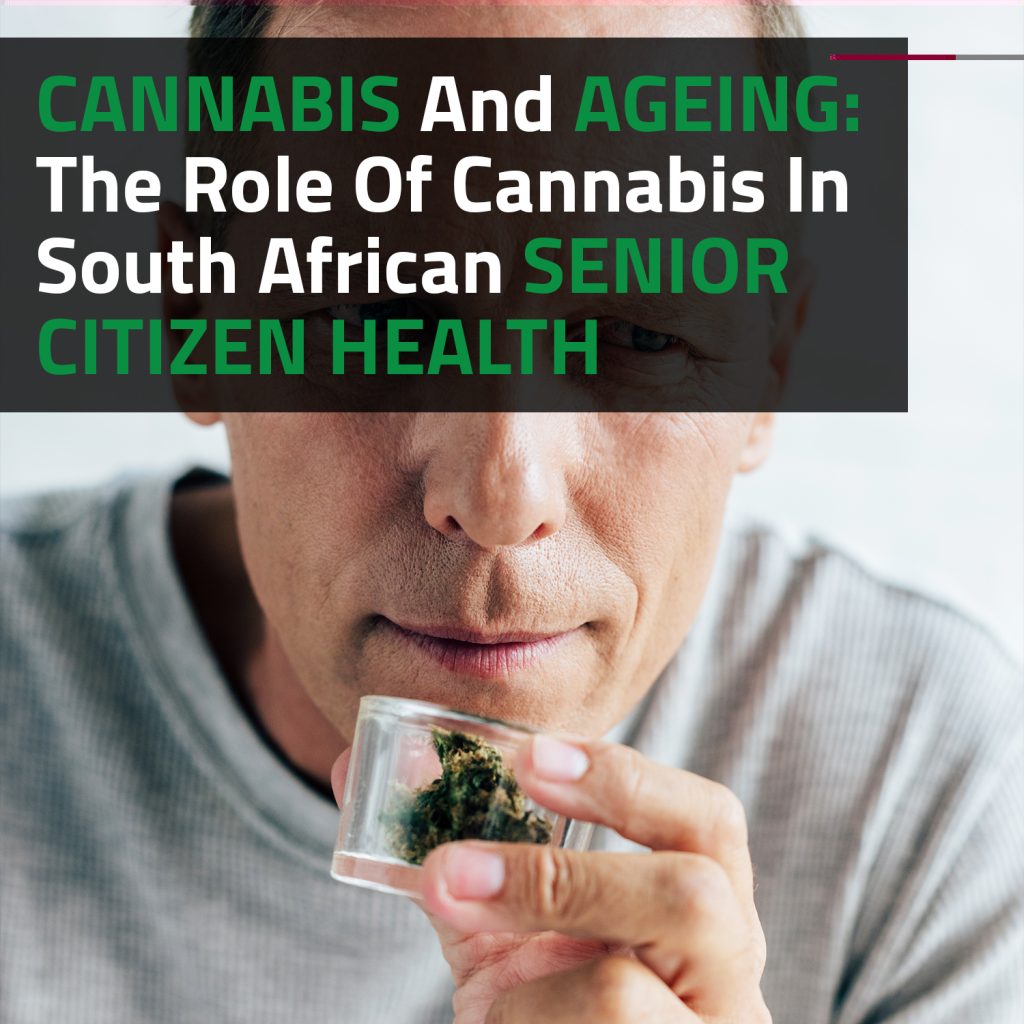As the world grapples with the challenges posed by an ageing population, there is a growing interest in alternative approaches to senior healthcare. In South Africa, a country known for its rich cultural diversity, the role of cannabis in addressing health issues among senior citizens is gaining attention.
Understanding Health Challenges Faced By Senior Citizens
As individuals journey through the golden years of life, a multitude of health challenges becomes increasingly prevalent. The ageing process brings with it a unique set of physical, cognitive, and emotional hurdles that can significantly impact the well-being of senior citizens.
Chronic Pain And Inflammation
Ageing often accompanies an increased susceptibility to chronic pain conditions, such as arthritis and musculoskeletal disorders. These ailments can compromise mobility, independence, and overall quality of life for seniors.
Cognitive Decline And Mental Health
Cognitive decline, including conditions like Alzheimer’s disease and dementia, poses significant challenges for seniors. Memory loss, confusion, and the gradual erosion of cognitive functions can profoundly affect both individuals and their families. Mental health issues, including depression and anxiety, can also become more prevalent in the elderly.
Sleep Disorders And Insomnia
Disrupted sleep patterns and insomnia are common complaints among senior citizens. Factors such as changes in circadian rhythms, underlying health conditions, and medication side effects can contribute to sleep disturbances, leading to fatigue and diminished daytime functioning.
Cardiovascular Health
Ageing is often accompanied by an increased risk of cardiovascular issues, including hypertension, heart disease, and stroke. These conditions can impact overall health and necessitate careful management to maintain a good quality of life.
Cannabis Components And Their Therapeutic Potential
Cannabis is gaining renewed attention for its therapeutic potential, particularly in the realm of healthcare. Central to this interest are the various components within cannabis, each contributing distinct properties that may offer a range of health benefits. Understanding these components is pivotal for unlocking the therapeutic potential of cannabis and harnessing its properties for targeted health interventions.
Cannabinoids
At the forefront of the cannabis conversation are cannabinoids, the chemical compounds unique to the plant. THC (Tetrahydrocannabinol) and CBD (Cannabidiol) are the most well-known among over a hundred identified cannabinoids. THC is renowned for its psychoactive effects, inducing the “high” associated with cannabis, while CBD is non-psychoactive and has garnered attention for its potential therapeutic applications.
THC (Tetrahydrocannabinol)
THC is known for its analgesic (pain-relieving) properties and its potential to induce relaxation. Its psychoactive nature has been harnessed for various medical conditions, including chronic pain, muscle spasms, and nausea.
CBD (Cannabidiol)
CBD, on the other hand, has gained popularity for its anti-inflammatory, anti-anxiety, and neuroprotective properties. It is being explored for its potential in managing conditions such as epilepsy, anxiety disorders, and even neurodegenerative diseases.
-
Black Leaf – Doobie Vaporizer 650mAh
R575.00 -
Reakiro – Broad Spectrum CBD Oil
R349.00 – R499.00 -
Zootly CBD Jellies Jar – Tutti Fruity (60mg)
R120.00 -
Reakiro – Hemp CBD Capsules
R349.00 – R499.00
Other Cannabinoids (CBG, CBN, Etc.)
Beyond THC and CBD, there are lesser-known cannabinoids like CBG (Cannabigerol) and CBN (Cannabinol), each exhibiting unique therapeutic potential. CBG is recognized for its anti-inflammatory effects, while CBN is being studied for its potential in aiding sleep.
Terpenes
Terpenes are aromatic compounds found in many plants, including cannabis. They contribute to the distinct flavours and scents of different cannabis strains. Importantly, terpenes may also interact with cannabinoids to produce what is known as the “entourage effect,” where the combined effects of the various compounds enhance therapeutic outcomes.
- Myrcene: Known for its sedative effects, myrcene may contribute to the relaxing properties of some cannabis strains.
- Limonene: With a citrusy aroma, limonene is thought to have mood-enhancing and anti-anxiety effects.
- Pinene: As the name suggests, pinene has a pine-like scent and is believed to have anti-inflammatory and bronchodilator effects.
Research Findings On Cannabis And Aging
In recent years, scientific curiosity surrounding the intersection of cannabis and ageing has blossomed, leading to a wealth of research findings that offer insights into the potential impacts of cannabis on the health and well-being of seniors. As the global population ages, understanding the implications of cannabis use for the elderly becomes increasingly important.
Pain Management
Numerous studies have investigated the efficacy of cannabinoids, particularly THC and CBD, in managing chronic pain associated with ageing. Research suggests that these compounds may offer a promising alternative or adjunct to traditional pain management strategies, providing relief for conditions like arthritis and neuropathy.
Neuroprotective Properties
One of the intriguing areas of research centres around the neuroprotective effects of cannabinoids. Studies indicate that certain cannabinoids, particularly CBD, may have neuroprotective properties, potentially mitigating age-related cognitive decline and offering a protective shield against neurodegenerative diseases like Alzheimer’s.
Sleep Improvement
Research has explored the impact of cannabinoids, particularly THC and CBD, on sleep patterns in the elderly. Findings suggest that cannabis may hold promise in addressing sleep disturbances and disorders, potentially improving both the quality and duration of sleep in seniors.
Mood Disorders And Anxiety
Studies have delved into the anxiolytic properties of cannabinoids, notably CBD, in addressing mood disorders and anxiety commonly experienced by seniors. Research findings hint at the potential of cannabis as a therapeutic intervention for mental health challenges associated with ageing.
Inflammatory And Autoimmune Conditions
The anti-inflammatory properties of cannabinoids, including CBD and CBG, have been a focal point of research in the context of ageing. Results suggest that these compounds may play a role in managing inflammatory conditions such as arthritis, offering seniors potential relief from associated symptoms.
Cardiovascular Health
Investigations into the effects of cannabis on cardiovascular health among the elderly have produced intriguing findings. While some studies suggest potential cardiovascular benefits, others underscore the importance of cautious use, especially considering individual health profiles.
Long-Term Safety And Adverse Effects
Longitudinal studies have sought to assess the long-term safety of cannabis use among seniors. These studies are crucial for understanding potential adverse effects, including cognitive impairment, dependency, and interactions with other medications commonly prescribed to the elderly population.
The Role Of Healthcare Professionals
As the discourse around the potential benefits of cannabis for seniors gains momentum, the role of healthcare professionals becomes increasingly pivotal in navigating the intersection of cannabis and ageing. Engaging with healthcare providers is essential for seniors seeking to incorporate cannabis into their wellness routines, ensuring informed, safe, and effective use.
Education And Guidance
Healthcare professionals play a crucial role in educating seniors about the potential benefits and risks of cannabis. Providing accurate information about the different cannabinoids, terpenes, delivery methods, and potential interactions with existing medications empowers seniors to make informed decisions about incorporating cannabis into their healthcare regimens.
Personalised Treatment Plans
Every individual is unique, and healthcare professionals are adept at crafting personalised treatment plans tailored to the specific health needs and conditions of each senior. Considering factors such as existing medical conditions, medications, and individual responses to cannabis allows healthcare providers to optimise the therapeutic potential of cannabis while minimising potential risks.
Monitoring And Adjustments
Continuous monitoring is vital when integrating cannabis into a senior’s healthcare routine. Healthcare professionals can assess the impact of cannabis on symptoms, side effects, and overall well-being. This ongoing evaluation enables adjustments to dosage, strains, or delivery methods as needed, ensuring that the cannabis treatment remains aligned with the evolving health status of the individual.
Concerns And Questions
Seniors may have concerns or questions about the use of cannabis, ranging from potential side effects to legal considerations. Healthcare professionals are well-equipped to address these concerns, fostering open communication and creating a safe space for seniors to discuss their experiences, challenges, and expectations related to cannabis use.
Collaboration With Specialists
In cases where seniors are managing complex health conditions, healthcare professionals can collaborate with specialists, such as pain management physicians, neurologists, or psychiatrists, to integrate cannabis into comprehensive treatment plans. This collaborative approach ensures a holistic perspective that considers all aspects of a senior’s health.
In the dynamic landscape of healthcare, the exploration of cannabis as a therapeutic ally for senior citizens in South Africa opens new avenues for holistic well-being. As we’ve journeyed through the intricacies of cannabis components and the crucial role of healthcare professionals, a nuanced understanding emerges – one that recognises the potential benefits while acknowledging the need for informed, individualised approaches.
As attitudes shift, regulations evolve, and research deepens, the potential for cannabis to enhance the lives of senior citizens becomes an exciting frontier in the pursuit of holistic well-being. With the guidance of healthcare professionals, seniors can navigate this path with confidence, embracing the potential benefits of cannabis as they age gracefully and with enhanced quality of life. As we stand at the crossroads of tradition and innovation, the journey towards holistic senior well-being with cannabis is a testament to the ever-evolving nature of healthcare and the unwavering commitment to improving lives.










